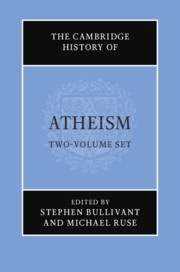Book contents
- The Cambridge History of Atheism
- The Cambridge History of Atheism
- Copyright page
- Dedication
- Contents
- Acknowledgments
- Contributors
- Introduction
- Part I Preliminaries
- Part II Atheisms in History
- Part III Reformation, Renaissance, Enlightenment
- Part IV Classical Modernity: Philosophical and Scientific Currents
- Part V Classical Modernity: Social and Political Currents
- Part VI Twentieth and Twenty-First Centuries: Intellectual and Artistic Currents
- 32 Analytic Philosophy
- 33 Naturalism
- 34 Existentialism
- 35 Atheism and Postmodern Philosophies
- 36 Ayn Rand and Objectivism
- 37 Darwinism
- 38 Literature
- 39 Music
- 40 Visual Arts
- 41 Film and Television
- Part VII Lived Atheism in the Twentieth- and Twenty-First Centuries: Case-Studies
- Part VIII Emerging Atheisms in the Twenty-First Century
- Part IX Conclusion
- Index
- References
38 - Literature
from Part VI - Twentieth and Twenty-First Centuries: Intellectual and Artistic Currents
Published online by Cambridge University Press: 25 September 2021
- The Cambridge History of Atheism
- The Cambridge History of Atheism
- Copyright page
- Dedication
- Contents
- Acknowledgments
- Contributors
- Introduction
- Part I Preliminaries
- Part II Atheisms in History
- Part III Reformation, Renaissance, Enlightenment
- Part IV Classical Modernity: Philosophical and Scientific Currents
- Part V Classical Modernity: Social and Political Currents
- Part VI Twentieth and Twenty-First Centuries: Intellectual and Artistic Currents
- 32 Analytic Philosophy
- 33 Naturalism
- 34 Existentialism
- 35 Atheism and Postmodern Philosophies
- 36 Ayn Rand and Objectivism
- 37 Darwinism
- 38 Literature
- 39 Music
- 40 Visual Arts
- 41 Film and Television
- Part VII Lived Atheism in the Twentieth- and Twenty-First Centuries: Case-Studies
- Part VIII Emerging Atheisms in the Twenty-First Century
- Part IX Conclusion
- Index
- References
Summary
‘I don’t believe in God, but I miss Him’, observes the novelist and critic Julian Barnes in Nothing to be Frightened Of, a rather melancholy memoir that explores the ways in which theism seems to be both impossible and persistent in late modernity (2009, 1). Literature in English has a long and complicated relationship with non-belief. Barnes’ oxymoronic longing for a deity in whom belief is no longer sustainable is symptomatic of a very long-standing tradition of sorrowful scepticism. Indeed, J. Hillis Miller famously argues that ‘[p]ost-medieval literature records, among other things, the gradual withdrawal of God from the world’ (1975, 1).
- Type
- Chapter
- Information
- The Cambridge History of Atheism , pp. 686 - 702Publisher: Cambridge University PressPrint publication year: 2021

